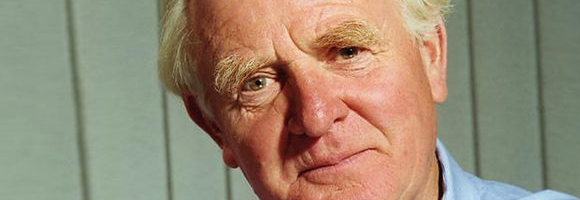john le carré

As a youth I somehow missed the novels by ↑John le Carré. On television I had seen the iconic movie ↑The Spy Who Came in from the Cold (Ritt 1965), starring Richard Burton, but somehow never cared to read the ↑book of the same name (le Carré 1963), or any other of le Carré’s. Meanwhile I am in the process of correcting this lapse. Some weeks ago I read “The Spy Who Came in from the Cold,” which really is haunting, then proceeded to the ↑Karla Trilogy: ↑Tinker, Tailor, Soldier, Spy (1974), ↑The Honourable Schoolboy (1977), and ↑Smiley’s People (1979). I’m through with the first two, and now I am somewhere in the first fifth of “Smiley’s People.” After that I’ll proceed to le Carré’s first two novels ↑Call for the Dead (1961), and ↑A Murder of Quality (1962). In those two his most known creation, the spymaster ↑George Smiley, already is at the centre. In between I guess I’ll watch the BBC’s ingenious TV-miniseries adaptations (Irvin 1979, Langton 1982) of the first and the last book of the Karla Trilogy—”The Honourable Schoolboy” wasn’t adapted because its settings in the Southeast Asian theatre would’ve been way too expensive. George Smiley is played congenially by Sir Alec Guinness—so much so that le Carré later said that Alec Guinness in fact had taken over the character. Then it’ll be December, and I am looking forward to see one of my favourite actors of all time, ↑Gary Oldman, as George Smiley (Alfredson 2011) in the cinema.
My motivation for diving into all that has several facets.
First, le Carré’s books are a hell of a read in every respect: narrative structure, principles, and concepts, character painting, drama, suspense, language [by means of the iPhone’s integrated English-English dictionary I am learning, or trying to learn, a ton of new vocabulary], and whatyouhave.
Second, cyberpunk literature [yes, even here and now I am still on the trail of the cyberpunk discourse] on the one hand owes much to ↑hardboiled detective fiction, on the other hand is a child of the cold war—hence ↵my post on the Billion Dollar Brain. For understanding cyberpunk and for understanding the contemporary world, understanding the cold war and its representations in works of fiction is imperative. The works of John le Carré I deem to be a perfect starting point. Not only does his œuvre span from the Sixties to the cold war’s end and beyond, but the man really knows what he is talking and writing about, having been a member of the British intelligence community himself, serving with MI5 and MI6 in the 1960s.
Third, at least on an abstract level, but then again on certain historical levels as well—and you can lapidate [See? I learned a new word!] me for that—anthropology and espionage indeed do have some things in common.
Fourth, I am myself a child of the cold war. ↑Bryan Alexander is, too. After I had posted ↵Isao Hashimoto’s video, he wrote to me: “I really like Hashimoto’s video. Sadly, I find it curiously soothing. Is this a Cold War childhood thing?”
In reply, I wrote, “that’s amazing indeed, because I feel quite similarly. In my blog-entry I wrote that the video ‘gave me the creeps’ … that’s partly because it also gave me a twisted sense of comfort. And, yes, I think it definitely is a Cold War childhood thing. Especially during the last half year or so I watch a lot of Cold-War movies and got myself thrillers by e.g. Len Deighton and John le Carré. In a way digesting this material recreates a part of my childhood’s ambience.”
Now, what I really wanted to hint you at: For the series Writers & Company of Canada’s CBCradio Eleanor Wachtel visited John le Carré at his home in Cornwall in August 2010. You can listen to the interview (nearly two hours) online: ↑Part 1, ↑Part 2. Highly recommended. It’s not just about le Carré’s life and background, and for sure isn’t simply a device for marketing his latest novel ↑Our Kind of Traitor (le Carré 2010). Rather the interview conveys deep insights into our world of today.


Isn’t he extraordinary? I, too, missed reading these books as a teenager, and only recently have turned to them.
It was watching the first season of Sandbaggers which triggered my interest in Cold War spy stuff. If you haven’t seen it, it’s excellent.
Extraordinary he is, indeed. And I take the CBCradio interview to be a real gem. Thanks a lot for the hint towards the Sandbaggers—no, I haven’t seen the series yet, but I am going to get it, and will watch it soon.
By the way, Bryan, have you seen ↵who ate it?, the third installment of my pop culture quiz? It’s horror movie related … :-)